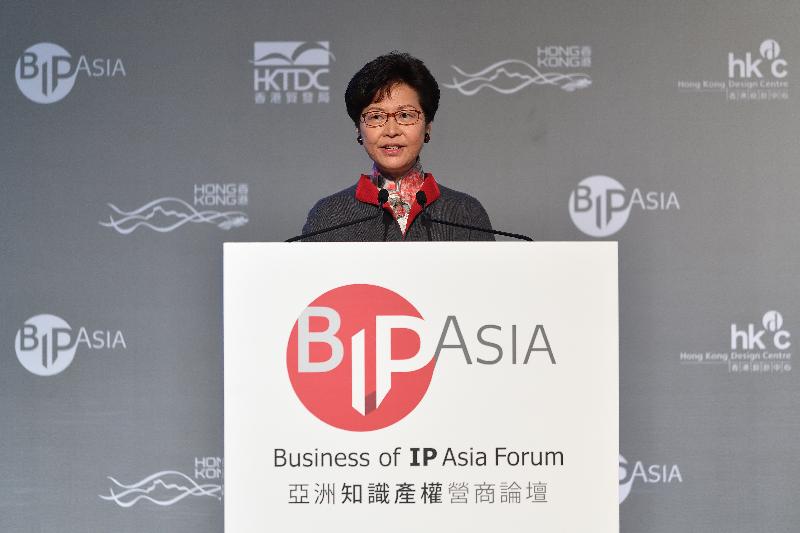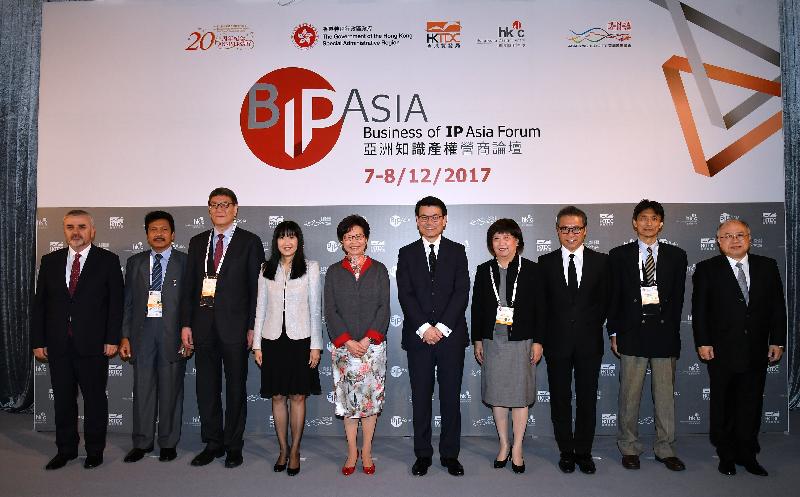Speech by CE at Business of IP Asia Forum (English only) (with photos/video)
****************************************************************************
Margaret (Executive Director of the Hong Kong Trade Development Council, Ms Margaret Fong), Mr He (Deputy Commissioner of the State Intellectual Property Office Mr He Hua), Ms Wang (Deputy Director General of the World Intellectual Property Organization Ms Wang Binying), distinguished guests, ladies and gentlemen,
Good morning. Welcome to the seventh Business of Intellectual Property Asia Forum. The theme of this year's Forum is "IP and Innovation - Propelling Change, Growth and Connectivity".
The stress on innovation is timely for each and every one of us here as government leaders, company owners and managers, academics and researchers, NGOs and service providers, intellectual property owners and users, buyers and sellers. In a fast-changing world, we are all, and have to be, innovators in order to meet the challenges ahead of us.
This Forum is equally timely for Hong Kong and for my new Government. We believe in innovation and technology (I&T), and we are determined that it will drive our future success. Which is why, in my first Policy Address delivered in October this year, I highlighted eight areas of our I&T agenda over the next five years, ranging from increasing research and development expenditure to nurturing talents. Work has already started in many of the areas, and I will personally chair an internal Steering Committee on Innovation and Technology to ensure that the various I&T initiatives will be taken forward expeditiously. This Committee will meet for the first time tomorrow.
We are also committed to strengthening our creative industries, particularly design, to diversify our economy and meet our growing social needs. Indeed, I came here straight from the opening of this year's Business of Design Week, which has become Asia's major annual event for design, innovation and brands over the years and features design leaders and innovators from all over the region and around the world.
But let's be clear on this: I&T, and the creative industries, won't go far in Hong Kong, or anywhere else, without a strong IP protection regime. In this regard, Hong Kong enjoys a significant edge, as our IP protection regime is recognised and well regarded internationally. In the latest World Economic Forum Global Competitiveness Report published in September, Hong Kong ranked ninth in IP protection among the 137 economies covered by the Report.
Couple that solid IP protection with our sound legal and financial systems, our business-friendly environment and world-class business and professional services, and you would know why Hong Kong is fast emerging as the region's IP trading hub. It helps, too, that our economy is increasingly connected with that of Mainland China. The Mainland is now a major IP powerhouse. I'm sure you'll hear more about the Mainland's IP rise over the next two days. Suffice to say that, in the year 2015, the Mainland of China became the first economy to receive more than a million patent applications in one year, as many as Japan, the Republic of Korea and the US combined.
No doubt, the Mainland will continue to be a leading player in the global IP arena given the strategic position accorded to IP and innovation in the 13th Five-Year Plan on National Economic and Social Development. It should also be noted that the Belt and Road Initiative and the Guangdong-Hong Kong-Macao Bay Area development, two visionary national strategies, will offer unprecedented opportunities, IP trading included. Under both strategies, Hong Kong will serve both as a sophisticated intermediary and a hub for fund-raising and professional services of all kinds.
Last month, Hong Kong signed an agreement on intellectual property co-operation with the nine IP offices of the pan-Pearl River Delta region. The agreement will promote the continuous deepening of regional IP co-operation and facilitate economic and cultural exchanges with countries and regions along the Belt and Road, thereby fostering joint economic development in the region. Also in the last month, we signed a Free Trade Agreement and related Investment Agreement with the 10 member states of the Association of Southeast Asian Nations (ASEAN). The agreements will generate new opportunities for business with ASEAN, already our second largest trading partner. They will also strengthen Hong Kong's position as an international trade, commerce and financial centre, creating fresh impetus for IP trading throughout the region.
IP is gaining unprecedented momentum around the world, spurring innovation and creativity, transforming commerce and reinventing the way we live, work and interact with one another. Consider the example of 3-D printing technology. As noted by the World Intellectual Property Organization, 3-D printing is streamlining design and manufacturing, affording greater design freedom and complete product customisation, reducing costs and material wastage and forging greater designer-client ties. But let's not forget that a full 3-D printing system would not have been possible without IP rights. They include patent rights in 3-D printing components, processes and raw printing material, copyright in controlling software programmes and trademarks of 3-D printer products. In short, the commercialisation of IP rights encourages both co-operation and ground-breaking innovation.
Indeed, IP is the very engine powering innovation. It is the principal means of establishing and protecting creations of the mind and providing a legal foundation for innovation and the advances it enables.
As IP becomes more and more important to us all, so too do the standards and the regulations that govern its creation and commercialisation. In Hong Kong, we are enhancing our IP regime to meet the needs of society and the global economy. We are, for example, developing an original grant patent system to support Hong Kong's rise as a regional I&T hub. We are working to implement the international trademark registration system, under the Protocol Relating to the Madrid Agreement Concerning International Registration of Marks. This will save companies time and money in obtaining and managing their international trademark registrations. My Government, taking on the role as a facilitator and a promoter, will also take forward various measures to strengthen Hong Kong's position as the IP trading nexus in Asia. We hope that these efforts would build a more solid ground for Hong Kong to drive the development of innovation and technology.
The Business of IP Asia Forum, launched in 2011, is a major component of our efforts, and we take pride to see that the Forum has risen to become a flagship event for IP in the region. We treasure the presence of over 80 renowned speakers worldwide who would share their insights and experiences on a myriad of current IP issues. They include senior officials from the State Intellectual Property Office, the World Intellectual Property Organization, the ASEAN Working Group on IP Cooperation, the Intellectual Property Strategy Headquarters at the Cabinet Office of Japan, and the Turkish Patent and Trademark Office. I would like to take this opportunity to express my sincere gratitude to them for their support to the event. And my thanks also go to all the participants in the Forum.
Ladies and gentlemen, innovation is the talk of the day, but is not something easy to achieve. With Hong Kong's unparalleled advantages, our can-do attitude and enterprising spirits, I have every confidence that we could brave our way down the innovation path for a better future. At the same time, Hong Kong fully recognises the role and value of the IP system at the centre of economic growth driven by I&T. We will harness its powers. Tapping the opportunities arising from IP trading will benefit Hong Kong and, surely, all of us.
I wish you all the best of business at this Forum, a memorable stay in Hong Kong and a happy, healthy and innovative new year ahead.
Thank you very much.
Ends/Thursday, December 7, 2017
Issued at HKT 12:30
Issued at HKT 12:30
NNNN




